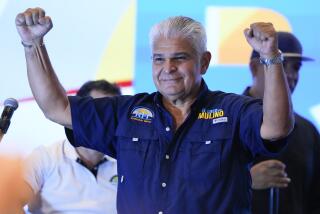Hits Failure to Include Civilian Foes : Delvalle Decries U.S. Tactics on Noriega
- Share via
PANAMA CITY — Panama’s deposed president, Eric A. Delvalle, chided the Reagan Administration on Friday for its tactics in trying to remove Gen. Manuel A. Noriega from power and said that next time Washington should listen to Panama’s civilian opposition and not go it alone.
“From the beginning,” Delvalle told reporters, “I maintained that a mistake was being committed in the negotiations with Gen. Noriega--first, because neither the political opposition nor the constitutional president of the republic (Delvalle) was represented, and second, because democracy was not being guaranteed.”
Delvalle, who three months ago fled his Panama City home and became an underground symbol of the effort to oust Noriega, said there might be violence if Noriega does not step down soon.
He suggested that Latin American governments become involved in the effort to remove Noriega. In this, he echoed comments made Wednesday by Secretary of State George P. Shultz in announcing the collapse of the talks.
In Washington, Assistant Secretary of State Elliott Abrams said Friday that the Reagan Administration hopes that other Latin American countries will join the United States in urging Panamanian officers to carry out a coup against Noriega.
“One of the things the Latins have to do,” Abrams told a group of reporters, “is very quietly get their military people to say to their contacts in Panama, ‘. . . Hey, the guy’s got to go.’ ”
Abrams has been openly urging Panamanian officers to turn against Noriega for several months. His comments suggested that preparing the groundwork for a coup could be the focus of American policy on Panama after the breakdown of negotiations.
“The day will come when Noriega will regret the last week of May, because that deal is off the table,” he said.
Abrams said Administration officials met Thursday to prepare new options in Panama for President Reagan but made no immediate decisions. As in the past, Abrams refused to rule out the use of military force against Noriega. “We’re looking at everything,” he said.
Delvalle, meanwhile, talked with reporters on the condition that his whereabouts be kept secret. He has said that he hides in six different houses in Panama. His wife and children have taken refuge at the residence of U.S. Ambassador Arthur H. Davis.
The United States recognizes Delvalle as Panama’s legal president, even though he controls no part of the country’s territory or government. In February, Noriega engineered the installation of Manuel Solis Palma as Panama’s president.
Offer Was Rejected
Until Tuesday, a special envoy of the Administration, Michael G. Kozak, had been trying to persuade Noriega to step down. He had been trying to get him to leave in return for a promise that the Administration would drop drug-trafficking charges against him in two Florida courts. Noriega rejected the offer.
According to Delvalle, U.S. officials believed that if Noriega openly announced his retirement, public pressure would have made his exit inevitable. “But I think we would have been left out on a limb,” Delvalle said.
The deposed president protested reports that his position as Panama’s legal leader was to be bargained away in the talks. He insisted that his symbolic position must be maintained as a message to the Panamanian military that “the armed forces are under the civilian government.”
He admitted that neither he nor any other opposition leaders were invited to take part in Kozak’s negotiations.
Delvalle, a sugar magnate, lost the presidency in February when he tried to dismiss Noriega. On Friday, he appeared to be clinging to some trappings of the office. He talked with reporters from behind a podium set up against a backdrop of a Panamanian flag pinned to the wall. He was pale, apparently from spending so much time indoors.
He said that economic sanctions imposed on Panama by the United States should be kept in place despite the steady disintegration of Panama’s economy. “We must keep the pressure on,” he said. “I am sure (it keeps) Noriega in a negotiating frame of mind.”
Delvalle dismissed suggestions that Panama might become a Communist state, like Cuba. He said Panamanians “do not want to live like that.” Moreover, he said, in the event of a Marxist takeover, the United States would be forced to invade in order to protect the neutrality of the Panama Canal.
Meanwhile, Noriega spoke to a group of leftist women from Latin America at a government convention hall in Panama City. He compared himself to several Latin political martyrs and generally criticized Washington for interfering in Panama’s affairs.
More to Read
Sign up for Essential California
The most important California stories and recommendations in your inbox every morning.
You may occasionally receive promotional content from the Los Angeles Times.













